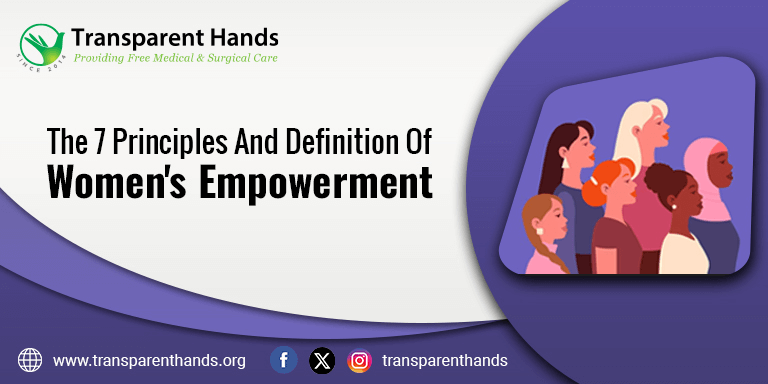The 7 Principles and Definition of Women’s Empowerment

In the ongoing journey towards creating a more equitable world, women’s empowerment is a cornerstone for fostering positive societal change. The United Nations has brought forth a set of principles, called the Global Impact Women’s Empowerment Principles, which charter a course for organizations, businesses, and marketplaces to champion gender equality.
In this blog, we will explore what is construed as women’s empowerment and how the proposed principles by the UN Global Impact may impact women all over the world.
What is Women’s Empowerment?
Simply put, to empower a marginalized gender is to give it the same amount of respect, and opportunities, to the other gender and have the same amount of faith in its abilities. This can translate to hearing their viewpoints, bringing them up and forward in society through education, training, literacy, and awareness.
However, when we ask someone the definition of women’s empowerment, we often hear different stories. To reiterate, women’s empowerment means uplifting the female gender through substantial acts.
The 7 Principles of Women’s Empowerment
1.Establish High-Level Corporate Leadership for Gender Equality
2.Treat All Women and Men Fairly at Work
3.Ensure the Health, Safety, and Well-being of All Women
4.Promote Education, Training, and Professional Development for Women
5.Implement Enterprise Development, Supply Chain, and Marketing Practices
6.Promote Equality Through Community Initiatives and Advocacy
7.Measure and Publicly Report on Progress to Achieve Gender Equality
Now that we’ve cleared the women’s empowerment definition, let’s have a look at the 7 principles.
Principle 1: Establish High-Level Corporate Leadership for Gender Equality
At the heart of any meaningful change lies leadership. The first principle advocates for establishing high-level corporate leadership committed to gender equality. This goes beyond mere rhetoric; it’s about fostering a culture where diversity and inclusion are not just buzzwords but integral components of the organizational DNA. Leaders set the tone, and when they champion gender equality, it permeates through the entire workforce.
Principle 2: Treat All Women and Men Fairly at Work
Equality starts in the workplace. Principle 2 emphasizes treating every individual with fairness, respect, and dignity. It’s not just about policies on paper but a commitment to upholding human rights and eradicating discrimination. By fostering an environment where everyone, regardless of gender, feels valued and respected, businesses can harness the full potential of their diverse workforce.
Principle 3: Ensure the Health, Safety, and Well-being of All Women
The third principle advocates the safety, well-being, and health of all employees at a workplace. It recognizes the right of every employee at a workplace to work in an environment free from any harm. By prioritizing the health of their employees, organizations not only practice ethical workplace standards but play their part in the welfare of the workforce.
Principle 4: Promote Education, Training, and Professional Development for Women
Education and professional development are strong tools for women’s empowerment. According to principle 4, avenues must be created that enable women’s access to education, professional development, and training opportunities. By enabling access to such opportunities, businesses help in breaking down barriers and open the doors to leadership roles.
Principle 5: Implement Enterprise Development, Supply Chain, and Marketing Practices that Empower Women
The impact of businesses extends far beyond their immediate sphere. Principle 5 urges businesses to consider the broader implications of their practices. By implementing enterprise development, supply chain, and marketing practices that empower women, companies not only contribute to economic sustainability but also foster an ecosystem where women can thrive.
Principle 6: Promote Equality Through Community Initiatives and Advocacy
The reach of corporate influence extends beyond the office walls. Principle 6 encourages businesses to actively engage in community initiatives and advocacy efforts that promote gender equality. By leveraging their resources and influence, businesses can become agents of change, inspiring communities to embrace the principles of empowerment.
Principle 7: Measure and Publicly Report on Progress to Achieve Gender Equality
Accountability is the linchpin of progress. Principle 7 emphasizes the significance of measuring and publicly reporting on efforts to achieve gender equality. Transparent reporting not only holds businesses accountable for their commitments but also sets a precedent for a culture of openness and continuous improvement.
How Transparent Hands Empower Women
Transparent Hands is an organization, dedicated to uplifting marginalized women by providing them with free medical treatment. The organization facilitates procedures such as c-sections, excisional biopsy, chemotherapy for breast cancer patients, and total abdominal hysterectomy, among other various general surgeries.
By providing them with potentially life-saving medical care, Transparent Hands empowers women to get back on their feet and join the workforce.
Conclusion
In embracing the United Nations Global Impact Women’s Empowerment Principles, businesses embark on a transformative journey towards a more equitable future. These principles are not mere guidelines; they represent a collective commitment to dismantling barriers, fostering inclusivity, and empowering women across the globe.
By establishing high-level corporate leadership, treating all individuals fairly, ensuring health and well-being, promoting education and professional development, implementing empowering practices, engaging in community initiatives, and measuring progress transparently, businesses can contribute significantly to the ongoing narrative of women’s empowerment.
The Story of a Struggling Woman
The journey towards gender equality is not without challenges, but it holds the promise of a brighter, more inclusive tomorrow. As businesses align with these principles, they become not just contributors to change but active architects of a world where every individual, regardless of gender, can realize their full potential.










Leave Your Comments